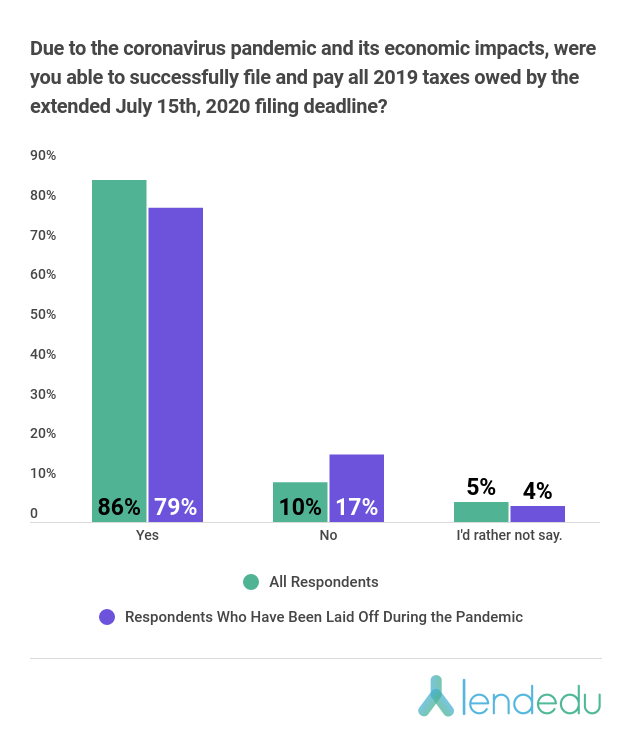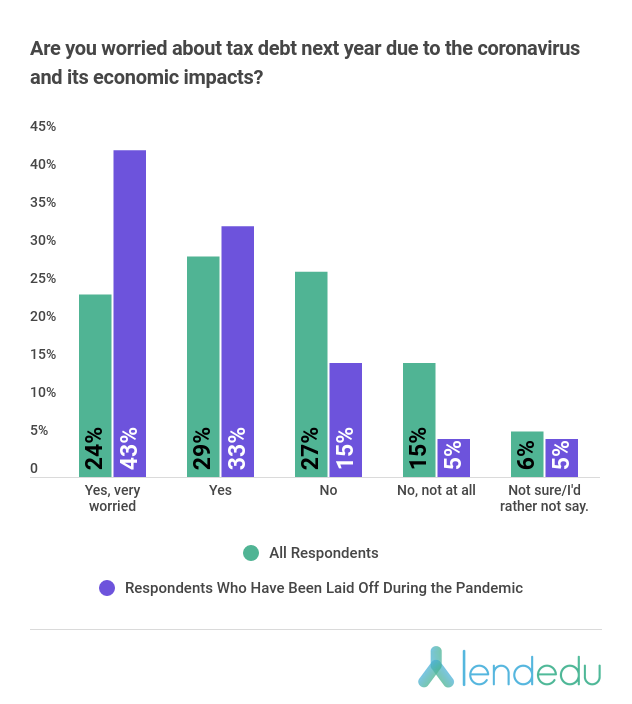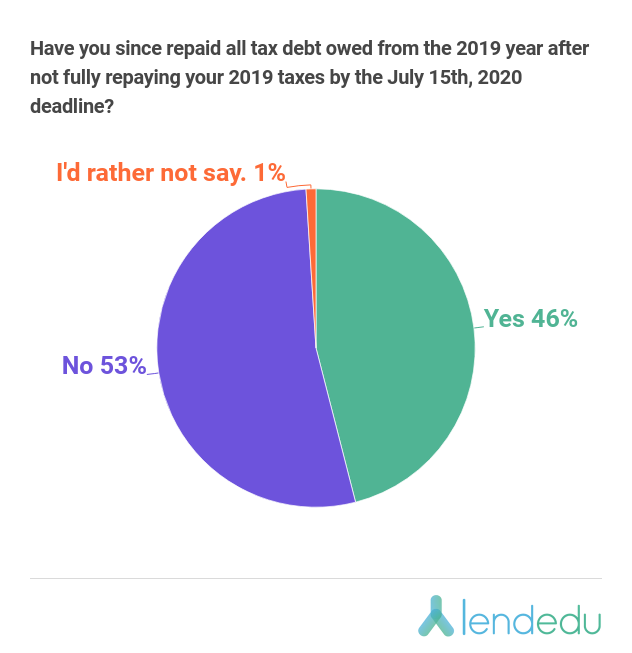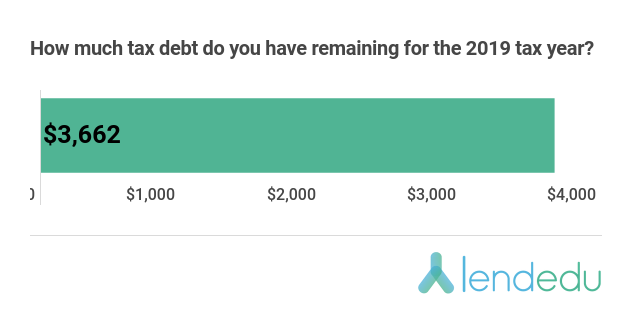By Mike Brown, LendEDU
Special to the Financial Independence Hub
Americans struggling to repay their 2019 taxes in the midst of a recession has been just another issue to deal with during the coronavirus pandemic.
Recognizing this, the Internal Revenue Service (IRS) actually extended the filing and payment deadline for 2019 tax obligations from April 15, 2020, to July 15, 2020.
The extension may have temporarily stopped the bleeding, yet there’s a looming tax debt crisis that has the potential to boil over in 2021 when 2020 taxes are due.
That’s because millions of Americans took to relying on unemployment benefits, retirement funds, or stock sales to stay afloat amidst the pandemic recession.
All of those things could lead to a heavier tax obligation in 2021, and with many people still out of work and struggling to get by, the country could be looking at staggering tax debt numbers next year.
The U.S. tax gap (total outstanding tax debt) currently hovers around $400 billion, but that figure could approach crisis levels after next year’s tax season.
To capture the struggles from the 2020 tax season and also the fears regarding the 2021 tax season, LendEDU surveyed 1,000 adult Americans to better understand what the average taxpayer has been dealing with during these unprecedented times.
Observations & Analysis
All data is based on an online survey of 1,000 adult Americans commissioned by LendEDU and conducted by research firm Pollfish. The survey was conducted on December 1, 2020. For some questions, the answer percentages may not add up to 100% exactly due to rounding.
17% of Americans laid off because of Pandemic unable to pay all 2019 Taxes
As mentioned above, the IRS extended the deadline to pay 2019 taxes by three months given the financial hardships experienced by many as a result of the coronavirus pandemic and recession.
However, paying all taxes owed by the July 15th deadline was still impossible for many Americans, especially those who have lost jobs due to the pandemic.
 Amongst respondents who have lost their jobs during the coronavirus pandemic, 17% were not able to pay their 2019 taxes on time and in full.
Amongst respondents who have lost their jobs during the coronavirus pandemic, 17% were not able to pay their 2019 taxes on time and in full.
Many still haven’t filed Tax Returns
Even if you are unable to fully pay all tax obligations by the filing deadline during any given year, you should always file your tax returns on time.
When dealing with the IRS, a failure-to-file penalty is much worse (5% of unpaid taxes for each month your tax return is late, up to 25%) then a failure-to-pay penalty (.5% of unpaid taxes for each month you don’t pay, up to 25%).
Yet still, data from our survey found many Americans that couldn’t pay all their taxes on time also didn’t file on time.
32% of taxpayers who couldn’t pay all 2019 taxes on time didn’t file their taxes by July 15th either. Even worse, 72% of these taxpayers who missed the July 15th filing deadline still have yet to file their tax returns for 2019, which could lead to serious financial and legal troubles.
Amongst respondents who at least have filed their 2019 tax returns despite not being able to fully pay all taxes by July 15th, here’s how many have been able to finally repay all 2019 taxes owed…
With 53% of applicable taxpayers still having tax debt from 2019, we wanted to see how much they have left…
For American taxpayers that still have some amount of tax debt from the 2019 tax year, the average amount remaining is $3,662.
If you are someone that is currently repaying tax debt, you may want to learn more about tax relief as a possible way to settle or reduce your tax bill.
The data from our survey makes it clear that repaying 2019 taxes has been unusually tough, and mass unemployment brought on by the coronavirus pandemic has been a big reason for the struggles.
But the coronavirus pandemic’s impact on the tax system won’t end in 2020 and likely will be more damaging in 2021 as taxes from this unprecedented year will be owed.
Over half worried about next year’s Tax Debt
The 2021 tax season is shaping up to be a brutal one as the full financial ramifications of the coronavirus pandemic and recession develop.
The majority of adult Americans, especially those who have lost their jobs at some point during the pandemic, are fearful about tax debt next year…
 Amongst all taxpaying respondents, a combined 53% are worried about owing tax debt next year as a result of the coronavirus pandemic and its economic impacts.
Amongst all taxpaying respondents, a combined 53% are worried about owing tax debt next year as a result of the coronavirus pandemic and its economic impacts.
However, the real story within the data to this particular question is what happens when the results are segmented to only include respondents that have been laid off at some point during the pandemic.
Within that cohort, a combined 76% are worried about having tax debt next year.
This could be due to unemployed respondents not having the confidence in their savings or general financial situations to cover tax obligations next year.
It could also pertain to the taxable unemployment benefits they have likely been collecting throughout the pandemic.
Worries that Financial Maneuvers made to stay afloat means more taxes in 2021
The coronavirus pandemic and recession put many Americans in dire financial straits.
Because of this, many people not only relied on unemployment benefits but also turned to more drastic measures like dipping into a retirement account or liquidating investments.
And according to our data, such maneuvers have applicable taxpayers concerned about their tax bill in 2021.
As various charts indicate, most taxpayers that had to do things like collect unemployment benefits or dip into a retirement account are concerned over their 2020 tax bill.
For reference, 19% of respondents borrowed money from a retirement account due to the pandemic recession, including 34% who were laid off. Additionally, 18% of respondents sold stocks or liquidated other investments due to the pandemic recession, including 30% who had lost their jobs.
Would any of these actions actually lead to a larger tax obligation when tax season rolls around next year?
While things are constantly changing due to the global pandemic, unemployment benefits are taxable on a federal level and in most states. So, unemployment benefits will likely lead to a larger tax bill in 2021 for those who received them.
The stimulus checks that came as part of the CARES Act aren’t subject to taxes, but since they are an advance on a person’s 2020 tax credit, they need to be reported when filing 2020 taxes. Still, tax debt stemming from stimulus checks shouldn’t be a concern.
Normally, any type of early withdrawal from a retirement account will get added to your income and thus subject to income tax, while also being subject to a penalty tax from the IRS. However, as a result of the pandemic, the IRS is waiving the penalty tax for early withdrawals up to $100,000 and is also expanding the window for paying the additional income tax. On this one, taxpayers will likely get a larger bill from Uncle Sam in 2021.
Finally, any stock that is sold for more than the investor paid for it is subject to a capital gains tax if the stock was held for at least one year. The capital gains tax rate is lower than the rate applied to other taxable income.
But, any profits from stock sales when the stock was held for less than one year will be taxed at the ordinary income tax rate. With many folks making impulsive market moves in the early months of the pandemic, stock sales could definitely become a big driver of tax debt in 2021.
Regardless of specific actions, it’s clear that paying 2020 taxes next year is going to be a mess for most and a struggle for those who had to resort to consequential financial decisions to survive the pandemic recession.
Methodology
All data found within this report is based on a survey commissioned by LendEDU and conducted online by survey platform Pollfish. In total, 1,000 adult Americans were surveyed. The appropriate respondents were found via Pollfish’s age filtering feature. This survey was conducted on December 1, 2020. All respondents were asked to answer all questions truthfully and to the best of their abilities.
See more of LendEDU’s Research here.
 In his role at LendEDU, Mike Brown uses data, usually from surveys and publicly-available resources, to identify emerging personal finance trends and tell unique stories. Mike’s work, featured in major outlets like The Wall Street Journal and The Washington Post, provides consumers with a personal finance measuring stick and can help them make informed finance decisions. You can follow LendEDU on Twitter @goLendEDU. This blog first appeared on the LendEDU site on Dec. 8, 2020.
In his role at LendEDU, Mike Brown uses data, usually from surveys and publicly-available resources, to identify emerging personal finance trends and tell unique stories. Mike’s work, featured in major outlets like The Wall Street Journal and The Washington Post, provides consumers with a personal finance measuring stick and can help them make informed finance decisions. You can follow LendEDU on Twitter @goLendEDU. This blog first appeared on the LendEDU site on Dec. 8, 2020.




